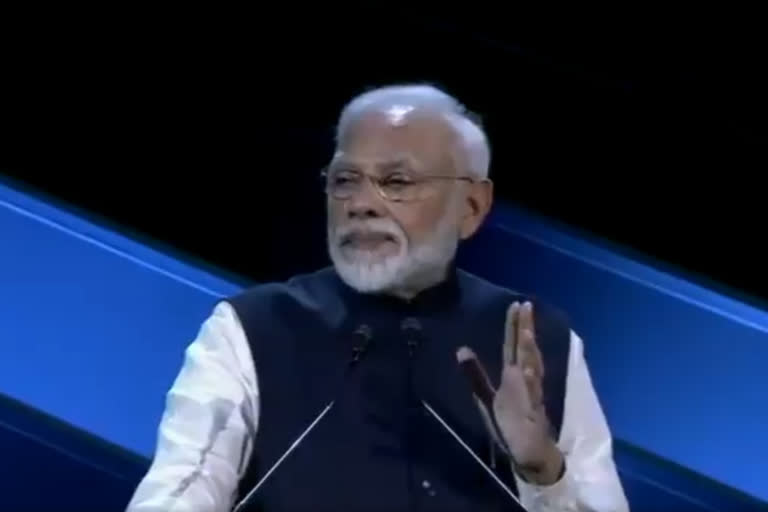Riyadh: India will invest a massive USD 100 billion in oil and gas infrastructure to meet energy needs of an economy that is being targeted to nearly double in five years, Prime Minister Narendra Modi said on Tuesday as he sought investment from oil kingpin Saudi Arabia and other nations to boost supplies.
Speaking at Saudi Arabia's annual investment forum, also known as 'Davos in the Desert', Modi promised stable, predictable and transparent policy regime to catalyse foreign investments.
"India is investing heavily in oil ad gas infrastructure," he said adding as much as USD 100 billion will be spent by 2024 in creating additional oil refining capacity, laying new pipelines and building gas import terminals.
The world's third-largest energy consumer is 83 per cent dependent on imports to meet its oil needs and about half of its gas needs are shipped from abroad. Its per capita energy consumption is a fraction of the global average and it is now investing heavily in physical infrastructure as well as city distribution to boost availability in a growing economy.
Saudi Arabia is India's second-largest supplier of crude oil and New Delhi is keen to expand this partnership beyond the buyer-seller relationship into a strategic one with cross investments.
Modi highlighted the recent opening of the fuel retailing sector for non-oil companies to lure investment in the world's fastest-growing consumption centre.
"India needs investments in the energy sector to meet the demand of a fast-expanding economy. And I request energy companies present here to take advantage of this opportunity," he said.
Modi said Saudi national oil company Aramco has decided to invest in the 60 million tonnes a year West Coast refinery project in Maharashtra - which will be Asia's biggest refinery.
Aramco, whose planned initial public offering is touted to be as big as the size of the Indian economy, too is keen to venture into fuel retailing and the petrochemical sector so as to lock-in consumer for its oil in a world that is fast-moving towards renewable energy sources and electric vehicles.
"I want to ensure you that India's rate of growth is going to rise further. We are taking steps for the growth of our economy," he said. "We are improving on our ease of doing business ranking. Due to political stability, predictable policy, and big diverse market, your investment in India will be most profitable."
Stating that infrastructure is a technology multiplier, he said it not only provides investment opportunity but it also important for the growth of the business.
"The requirement of physical infrastructure is in developing countries. Asia requires USD 700 billion per year for infrastructure development. We have set an investment target of spending USD 1.5 trillion on infrastructure development in the next few years," he said.
This target includes oil and gas plus other infrastructures such as roads, airports, and ports.
The prime minister said India is targeting to nearly double the size of its economy to USD 5 trillion in the next five years. "Roadmap for reaching the USD 5 trillion economy target is ready. The target is not only about quantitative growth but also about improving the quality of life of every Indian."
He said five big trends impacting global businesses are technology and innovation, infrastructure, human resources, compassion for the environment and business-friendly governance.
Transformative technologies such as Artifical Intelligence, Genetics, and nano-technology have become part of daily life, he said adding India has become the world's third-largest startup ecosystem.
"Indian start-ups are acing everything, from food delivery to transport, to hospitality, to medical treatment, to tourism," he said urging venture funds to invest in start-ups in the country.
Stating that infrastructure is an opportunity multiplier, he said infrastructure is needed for the business to grow.
India, he said, is adopted an integrated approach for infrastructure development. "India is integrating infrastructure through one nation one power grid, one nation one gas grid and one water grid, one nation one mobility card, one nation one optical fibre network."
Infrastructure growth in India will be in double-digit and there is no possibility of capacity saturation.
For international investment depends on quality manpower and so skilling of human resources is essential, he said, adding 400 million people will be skilled in different streams in 3-4 years.
"International trade agreements should not be restricted to goods alone. Manpower and talent mobility should be an integral part of it," he said.
Also read|All you want to know about India-Saudi Strategic Partnership Council



